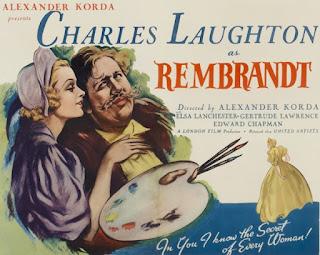
“In the seventeenth century, Holland was a world power, her ships carried treasure to Amsterdam from all parts of the earth. But her proudest glory was the son of a miller from Leyden, Rembrandt von Rifn, the greatest painter that has ever lived. He dies in obscurity, his belongings worth no more than a few shillings. Today, no millionaire is worth the money the works of Rembrandt would realise, if ever offered for sale”.
Charles Laughton fascinates me. His performances in such movies as The Private Life of Henry VIII, Island of Lost Souls, 1939’s The Hunchback of Notre Dame, Witness for the Prosecution, and Spartacus made him seem larger than life. Even his sole directorial effort, The Night of the Hunter, proved extraordinary.
Directed by Alexander Korda, 1936’s Rembrandt takes full advantage of its star’s natural charisma, to the point that even when the story becomes routine and predictable, Laughton single-handedly rescues it from mediocrity.
Despondent over the untimely death of his beloved wife (and muse) Saskia, renowned artist Rembrandt von Rifn (Laughton) suffers a series of financial disasters. His longtime housekeeper and new lover Geertje (Gertrude Lawrence), who assisted in the raising of Rembrandt’s son Titus (played as an adult by John Bryning), tries to persuade the stubborn artist to seek a commission from the Prince. Rembrandt, however, finds himself drawn to the beggars and the homeless, seeing in them a nobility he feels is sorely lacking in the aristocracy.
Rembrandt further angers Geertje when he tosses her aside, falling in love instead with the new household maid Hendrickje (Elsa Lanchester). Though shunned by creditors and eventually even the church, Rembrandt and Hendrickje live simple lives, and are happy, even if their time together may prove shorter than they realize.
As with The Private Life of Henry VIII and The Rise of Catherine the Great, Korda and his team did a remarkable job recreating both the time (the 17th century) and place (Holland) in which Rembrandt is set, with wonderfully realized costumes and set pieces. Yet as great as the movie looks, it is Laughton who, from start to finish, commands our attention. Whether sullen and depressed over the loss of his beloved wife Saskia (who, even when alive, never appears on-screen) or defiantly challenging the upper class (one of his paintings, commissioned by the Civic Guard, is ridiculed for not being austere enough), Laughton’s Rembrandt remains a fascinating character. The story does occasionally tread in familiar territory (the struggling artist not respected by his peers, love conquering all, etc), yet Laughton rises above the banality, delivering a series of monologues - on everything from Solomon to love - that garner our undivided attention.
Laughton’s performance, coupled with Korda’s eye for detail and some well-staged scenes (the near-silent sequence in which Rembrandt is first attracted to Geertje has a sexual energy that is palpable), helped lift Rembrandt above the standard biopic, transforming it into something much more substantial.
Rating: 8.5 out of 10
